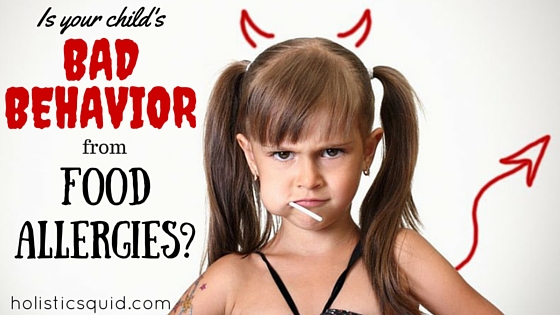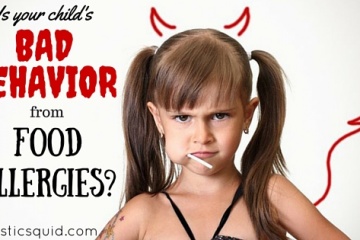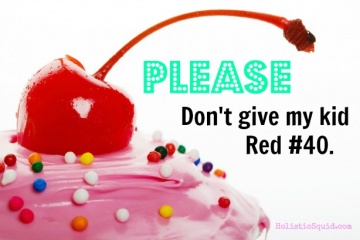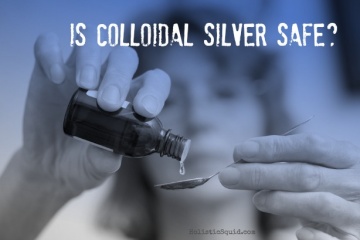
When my youngest was in kindergarten, I went on a rant about red food dye because it kept showing up for school party snacks. Why? Because I've witnessed firsthand how synthetic “food” can make my kids into crazy people. In this post Jaclyn tells us why certain foods – even natural ones – can lead to problems and how to avoid them. ~Emily
We recently talked about reversing food allergies, but what if it's your child who has the food allergies, and what if the symptoms of food allergies are really disguised as… bad behavior?
That may be a new concept to you, but hear me out. I have personally lived with a child who can go from kind and complacent to mean and aggressive from zero to sixty, and it's not so much due to a brain imbalance as a gut imbalance. Yep, food has a Dr. Jekyl and Mr. Hyde effect on my son. Curious if food is really the reason for your child's bad behavior? Read on.
Don't feed the toddler!
My son was around three when I started paying more attention to what he was eating. It would be years before we figured out that he had lots of food intolerances that eventually led us to GAPS, a strict, temporary, gut-healing diet. But when we were first starting to learn about the effects of food on his behavior, it was all trial and error.
I first figured out that food dyes, high fructose corn syrup, monosodium glutamate, artificial flavors and sweeteners, and other processed ingredients were obvious culprits, but I soon started to see a connection to refined bread as well.
I will never forget being at a restaurant and asking a family member not to give my son the bread. When he didn't take me seriously and fed him bread, my son went from sitting nicely at the table to running around, yelling, and crawling under the table… in a matter of minutes.
The whole family took me seriously then, and I've never had to justify our food choices with my family again.
Allergy vs. intolerance vs. sensitivity
If you have a child who goes into anaphylaxis shock in response to food allergies, you may be thinking that a little bad behavior is not a true food allergy. You're right. Let's break down the varying levels of food “allergies”.
True allergies occur when the immune system has created antibodies to a food protein. When that food is eaten, you may experience a rash or hives, difficulty breathing, or vomiting and/or diarrhea.
Intolerance is similar to allergy, in that your body has difficulty digesting a particular food and may have even created antibodies to that food, but an intolerance will not result in anaphylaxis shock. More likely, gastrointestinal symptoms will occur.
Food sensitivities are less severe than an intolerance, and you may still be able to eat small amounts of the food without a visible reaction. Reactions may be gastrointestinal, but can also include lesser-known symptoms like skin conditions and more.
Although a true food allergy that can cause life-threatening reactions is more severe, all of these symptoms should be taken seriously, because they are a clue that something is amiss in your gut.
How food allergies cause bad behavior
So, whether we're talking about true allergy, intolerance, or sensitivity, when it comes to bad behavior, these semantics don't matter much. If you are experiencing difficult behaviors with your child, food may be the culprit.
It has been said that the gut is the second brain. Our digestive system controls more than we think, and the food we put into it has a big impact on our overall health.
Many scientific studies are now revealing just how important diet may be to improving behavioral and mental health. According to one study, “There are numerous reports of diet affecting various manifestations of psychiatric disorders, including schizophrenia, mono- and bipolar depression, attention deficit -hyperactivity disorder (ADHD), and autism… Diet has also been shown to play a key role in shaping the structure and functional properties of the gut microbiota…” (source)
In 2013, researchers at UCLA found that “bacteria ingested in food can affect brain function in humans.” (source) The study concluded that eating probiotic foods and a diet rich in vegetables and lower in typical “western diet” foods had a positive impact on brain health.
Another study linked anxiety disorders to chronic colitis (a digestive disease), and found that probiotic supplementation had a positive effect on symptoms. (source)
Finally, a study done in Norway concluded that a gut-brain connection was not only possible, but probable, as a contributing factor in autism spectrum disorders (ASD). (source) The study found that children with ASD excreted excess urinary peptides, which decreased once a gluten and casein-free diet was implemented.
Which foods cause bad behavior?
If the science is telling us that food can have a big impact on behavior, then how do we know which ones to avoid?
Here are some common trigger foods:
Gluten
Gluteomorphin is an opioid peptide created from gluten proteins (as discussed in the study mentioned above) that should be broken down by digestive enzymes to become amino acids, which our bodies need. When digestion is impaired and the gluten proteins, instead, become opioids, which then attach to the brain, they can cause behaviors like those seen in ASD or ADHD, where children often seek stimuli and are seemingly unaffected by discipline or even actions that cause them to hurt themselves.
Dairy
Like gluten, dairy proteins can turn into caseomorphins, which, again, attach to the brain and cause undesirable behaviors.
Food dyes
Food dyes like red 40 are known as excitotoxins because they excite brain neurons, causing them to misfire, and sending them to an early cell death.
Other excitotoxins
These include artificial sweeteners and monosodium glutamate.
Sugar
No surprise here that sugar can cause bad behavior. It gets kids hyped up, causing them to lack self-control and become hyperactive, then leaves them crashing and cranky later.
Grains
Like sugar, grains can cause blood sugar fluctuations due to their high starch content, resulting in roller coaster behavior. My son personally has had strong reactions to corn, which cause him to be angry and aggressive. This could be due to the cross-reactivity of corn and gluten, which means the proteins are similar.
How can I avoid ALL these foods for my child?
If your child has frequent bad behavior, consider making some dietary changes before seeking medical intervention. Many children experience complete reversal of behavioral symptoms with simple diet changes, though others need more intensive healing.
- Remove excitotoxins: artificial sweeteners, food dyes, monosodium glutamate, etc.
- Remove foods that may be creating an opioid effect for your child: gluten, dairy, and other foods that may cross-react for some kids like corn and other grains.
- Reduce or eliminate sugar and starchy foods like potatoes.
- Consider an intensive healing diet like GAPS.
For a great starting place on healing the gut to improve bad behavior and more, read this post: How to heal leaky gut.
Please share this post so other parents can also learn about treating their child's bad behavior with food, not drugs.
When Jaclyn became a mom more than eight years ago, health food was the last thing on her mind, but when her oldest son began to struggle with behavioral disorders, she dove in headfirst to begin learning about how to live and eat naturally. When she began to focus on paleo and GAPS diet foods, her son’s behavior began to improve, her children were healed of eczema and digestive problems, and her own thyroid disorder was healed. Today, she blogs about raising her four boys to be happy and healthy at The Family That Heals Together.











This is a GREAT introductory post, but you forgot an important one and I want to mention it here in case any readers just beginning this journey venture down here: salicylates. High-salicylate foods are a major trigger for emotional volatility and physical aggression in our household. If your child is sensitive to artificial forms of coloring, they may also be sensitive even to certain naturally present plant constituents. We had begun our transition onto the GAPS diet and thus were already free of grains, refined sugars, and artificial dyes and flavorings, BUT we were relying heavily on high salicylate foods – in our housheold, it was tomato products, bell peppers, grapes, and apples.
When we slip up, we pay for it. We ate a large amount kf them this past week due to spring break and Mommy’s exasperation. And we had meltdowns like we hadn’t seen in months, which included physical aggression toward family members.
If you’re looking for a good introduction on the topic, The All Natural Mother’s Guide to the Feingold Diet is a really great book.
Hannah, YES! EXACTLY what I was going to write. We started on GAPS diet and my daughter’s behavior became worse, and her intellectual capacity was significantly reduced whereby there were days she could not READ or do simple math and other days, she was years ahead of her peers. The answer was eliminating all the high salicylate foods. Problems SOLVED! We first started on the Feingold Diet (ADHDdiet .com) and then needed additional support and went to FAILSAFE Diet which was a game changer. FAILSAFE diet removes salicylates, amines, and glutamates. What a life changing diet for our daughter! She slept well for the first time in her life. No nightmares, no tantrums, no aggression and violence, no meltdowns, no hyperactivity… just a very happy and smart child. I urge all parents who are having behaviorial issues to look into Feingold Diet or Failsafe Diet. Amazing!!!
Great post! I shared it on my SM cause I thought it was so good! I work with kids on a daily basis and see this first hand. While I don’t believe every child is allergic to certain foods, I do believe that certain foods (like gluten and dairy) can effect their behavior (regardless of an allergie if that makes sense). I wish more parents would realize sometimes the reason your child can’t sleep, is acting crazy, or irritable, is because of what you are putting in them.
My daughter gets very aggressive from certain types of food. I haven’t pinpointed them all yet, but I can tell if she’s eaten something weird at school–the bad behavior stays around for a few days. The end of the school year has been hard because people seem to insist on feeding kids all kinds of junk to “celebrate.” I provide alternatives when I know about it, but sometimes I don’t know and my daughter will just eat it if it’s offered, thinking the adults around her have read the ingredients (she’s 8 and somewhat able to do this herself, but she’s not going to question the ice cream cups with high fructose corn syrup or soy whatever!). Our lives would just be a lot easier if people would ease up and stop feeding kids junk! Food choices definitely influence behavior.
This is a good article and informative, but could you please remove ‘allergy’ from the title and replace it with food intolerances? Having a good allergy as you mention in the article, a TRUE food allergy is life threatening. Your article confuses and perpetuates the difficulties those of us with true food allergies face. People associate that word, allergy, when used in this context, as something you can still have. For anyone allergic to a food, they CANNOT have it. It can am deathly will kill them. You’re putting a word in this article that doesn’t belong there. Bad behavior is not due to an allergy. It’s an intolerance. Please update this article. My child cannot have any form of nuts because they can kill him. They won’t cause him to be moody, it’s not a tolerable but annoying problem, it’s an allergy. It’s a diagnosed condition. A celiac can have gluten, it will cause problems and over time hurt the person’s body, but will not immediately kill them. My son’s food allergy to nuts could kill him.
This is an informative article in how to understand that foods can affect our children, but please correct your interpretation of the word allergy and its meaning, and put this article into the context of food sensitivities and intolerances.
Hey Mommatopeanutallergicchild,
Signs of allergies show up on a spectrum, from mild to severe. Many times, a food allergy only provokes only mild symptoms. For example hives or wheezing. A life-threatening response like anaphylaxis is an extreme allergic response.
Hope this helps! All the best,
Emily xoxo